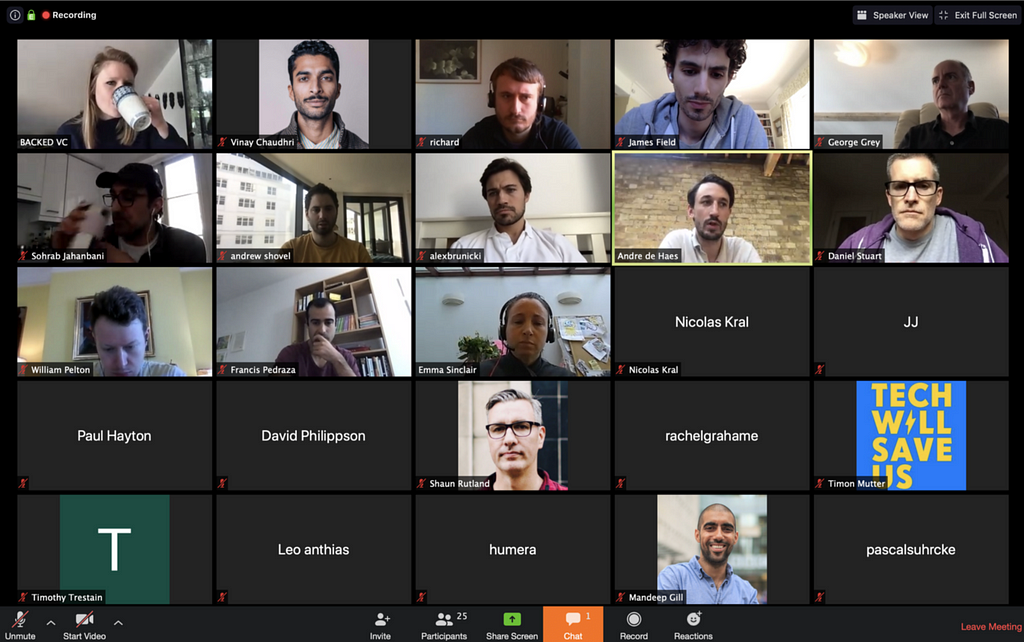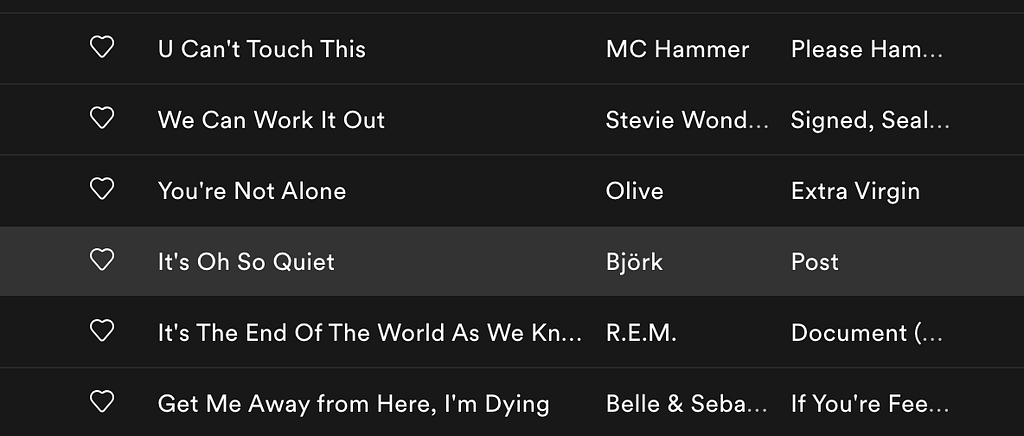This year has been an advanced course in humanity for our human-centric team
On 4 March 2020, my team at Backed VC hosted an event. Twenty-ish people streamed into our offices, passed each other beverages and pastries, put down glasses of water and picked them back up again, huddled around our tea point to whisper comments directly into each other’s ears.
Recounting that today, it feels unhinged.
“Do you think they’ll cancel Glastonbury?”
On 10 March I sent a hastily-researched Covid-19 Business Continuity Guide to our portfolio founders, outdated as soon as it was sent (the hubristic “We will be trialling remote work for five business days” still haunts me). On 11 March, I met with a treasured contact whom I would have liked to greet with a hug, and we solemnly fist-bumped instead (missing the point but winning early points for effort). Snatched conversation snippets overheard: “Did you hear it’s at Facebook now?” “Do you think they’ll cancel Glastonbury?” “I’m just back from a ski trip, I hope I’m okay to attend this event…”
All the potential energy of this pandemic, the anxiety and fear, amassed, until a collective tipping point where we all decided, without really discussing it, that we would enter our own mini-lockdown commencing 6pm on Thursday 12 March, leaving the office looking like we’d done a moonlight flit. That was a year ago. The UK Government would follow suit four days later.
— — — — —
As a VC firm, our anxieties were numerous. Heaped on to “What if we all catch it?” and “What if all our founders catch it?” were, in no particular order: concerns about LPs’ appetite for investing when we ourselves were fundraising; questions about our own ability to reach conviction with new founders without ever sitting across a table from them; the fact our now Investment Manager had been with us for single-digit weeks having never participated in a venture deal before; worry that exceptional founders would hold their cards until a market correction. All troubling stuff, and the source of a few sleepless nights — and that’s when we thought it would all be over in a couple of months.
I was terrified of another extended period of successive lay-offs, struggle meals and survival jobs
I had worries of my own. The Great Recession, which hit when I was a first-jobber in the recruitment industry, roundly and repeatedly kicked my ass for several years, so the first mention of another recession sent me trembling to my therapist. I was terrified of another extended period of successive lay-offs, struggle meals and survival jobs. Mercifully, our CEO addressed the team to reassured us that our jobs were safe, reminding us simultaneously that we must be sensitive to those who may not be so lucky — but that sort of tension never really dissipates. I’m now watching with pity and terror as Gen Z face the same things I and my friends went through over a decade ago.
On an emotional level, we worried about what would happen to our company culture while we remained distributed. We’re a small team of eight who have always been intentional about creating a strong culture (so strong that we periodically ask “is this a cult?”). We set our values early, we talk about them constantly, and by putting them into practice we’ve created strong professional and interpersonal bonds. Three of my closest friends are colleagues, and we kind of assumed that this was the secret sauce that made our collaborative efforts so special. We were going to miss each other, we knew that much, but would it feel the same over Slack and Zoom?
The answer came quickly: of course it bloody doesn’t. But in some ways, unbelievably, it’s been better.
Culture is what you repeatedly do, not where you repeatedly go

When you’re in a ‘people’ role, the quest to define your company culture never truly ends. I can tell you for free, though, that what your company culture is not, is your office. Your culture is not your coffee machine or even the “water cooler” (literal or metaphorical), the fußball table for those who do, the plants, your walnut-finish desks. This was a tough one for us to swallow, having moved into and painstakingly renovated our extremely cute HQ mere months before Pandora’s Box opened. We love that office, and we poured a great deal of energy and resources into turning it, like our best smart-casual outfit, into a stylish expression of who we were as a team. We were to learn what remote-first companies have known all along: culture is what you repeatedly do, not where you repeatedly go.
As Director of People Operations and de facto custodian of the culture, I pathetically started trying to make ‘fetch’ happen: a midweek coffee slot, a team chillin’ hour over Zoom on Fridays, an abortive attempt at a collaborative Spotify playlist. All died an early death because they didn’t actually speak to who we were, or why we work so well together.

What we did continue to do, repeatedly albeit remotely, was collaborate. As soon as lockdown hit, we became almost aggressively co-creative, scheduling extraordinary cross-functional calls to discuss how to harness the magic of our respective talents to produce something new and relevant to wtf was going on. It’s what made three two-day Zoom “offsites” both possible and bearable. It’s how our proprietary Network and Community apps came about, as well as our DD Library, our portfolio newsletter and wellbeing programme, the Values Development course, a workshop series on Building Inclusive Teams, our Fundraising Support offering… there are more, but assuming your lockdown attention span is anything like mine, I’ll do you a favour and leave it there. You get the idea.
Oh, and we’ve backed nine exceptional companies since the start of All This.
Don’t let anyone tell you a friendship over the internet isn’t real
I grew up on a recently-democratised internet, making friends on message boards (RIP the Bust Lounge), staying in touch through LiveJournal and MSN Messenger. Fifteen to twenty years later (showing my vintage), I’ve met several of those amazing people, with some still on heavy rotation in my IRL social life. There are many more I’ve not — but don’t let anyone tell you a friendship over the internet isn’t real. When Texas froze over this winter, one friend in Austin was stuck in her apartment block without heat or water, rapidly running out of food and medicine for her elderly cat, when another friend (in Chicago) contacted us all with a PayPal link. Literally overnight, we raised nearly $2,000 so that our friend — whom some of us had never looked in the eye — could stay in a warm hotel for a few days, take a shower, care for her pet.
Similarly, the working relationships we have at Backed, the bonds we’ve formed as a team — including with the remotely onboarded Finance Manager, Dominic — are still real over the internet. We’ve built them in. I know we put our head above the parapet when we call ourselves “the human-centric VC”, because there are so many ways you can f*** that up and get quite rightly called out on it; but we have always taken the radical approach that at the very root of our business we practise care for each other, and each other’s work and careers, from the way we structure our meetings all the way up and out. So it was natural when we asked for and took mental health days; we spoke openly about burnout, and fears around sustaining the workload we’d made the new benchmark “when all this is over”. We sent each other voice notes and little gifts. We made time across time zones. We made it work.
— — — — — — — — — — — — —
I’m not about to tell you that the pandemic has been a good thing because it strengthened and confirmed the culture at a VC firm. I don’t think that the catastrophe in Texas was worth it for the warm fuzzies my little group got out of helping our friend. But I do think that we have, collectively, managed to wrestle something positive from the jaws of calamity over the last year. Learning and practising how to be good to each other over long distances and for long periods of time has, I think, afforded us some greater understanding of what it means to be human. For that, I think we’re allowed a moment of reflection and gratitude.
